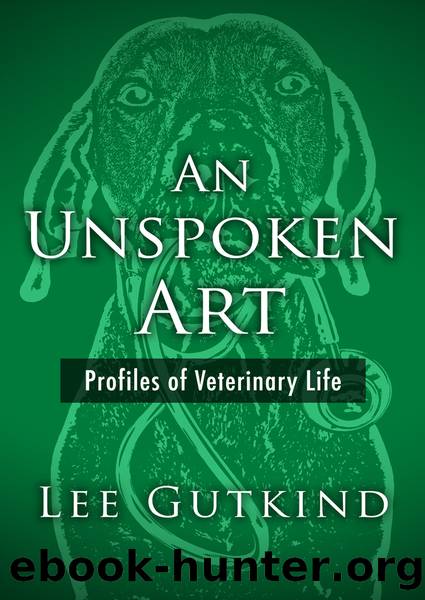An Unspoken Art by Gutkind Lee;

Author:Gutkind, Lee; [Gutkind, Lee]
Language: eng
Format: epub
ISBN: 1806551
Publisher: Open Road Integrated Media, Inc.
The Quitter
THE HORSE ERIC PARENTE has been asked to evaluate is a quitter. This horse goes like hell for five-sixths of the race and then, just about the time the owners are counting their money and computing their profits, he slows down. Parente, a thirty-three-year-old veterinarian, a graduate of Cornell School of Veterinary Medicine, whose specialty is sports medicine, is muscular and well-built, with thick brown hair lightly speckled with gray, a square jaw, and a row of perfect teeth. His office is a mess. There are sweat clothes and running shoes stashed under his desk. Heâs wearing basketball shoes, white socks, khakis, a light-blue shirt with a New Bolton emblem on it, significantly wrinkled after a long semisleepless night.
Among other interests, Parente has been focusing his attention upon the many problems having to do with lameness in the hock, which is a common ailment for horses. Hocks are like human ankles. Steroids are usually used to treat these problems, Parente says. âThe cheaper horses get more steroids because theyâre not going to win many races, so the owners race them and forget them, whereas for a more expensive horse an owner will invest the money to permanently heal the lameness and eradicate the pain.â
As we walk from his office to the Jeffords Treadmill Facility, Parente points out that 50 percent of the horses that are bred for racing never get to the track. But in this case, the chocolate brown three-year-old with a brown mane and one white foot races well until he slows at the home stretch, the point at which he should be barreling at top speed. Preliminary examination has ruled out obvious problems, such as lameness.
First, Parente must grind off the traction-inducing toe grabs on the horseâs shoes, which would tear into the rubber of the treadmill. For this he utilizes a large carpenterâs sander with extra-coarse sandpaper. He shows the grinder to the horse and triggers it so that the horse can become familiar with its soundâand also learn to trust him. He also places his hand on the horse. He holds on when the horse tries to jerk away. In a persistently gentle manner, Parente holds on tightly until the horse is comfortable with his touch.
Iâve observed him practice a similar philosophy with the horseâs mouth during a dental examination. âHold on, allow them to make their objections. But be relaxed and firm at the same time,â he says. Horses, Parente explained, have incisors in front and molars in the back of the mouth, and an interdental space in the middle. âSo if your psychology fails, and they decide to bite down with your hands in their mouth, your fingers will be safe if you keep them in the interdental space.â As an added safeguard, a veterinarian can reposition a horseâs tongue to the side so that it lies between molars. âThen, if they do get testy and chomp down, it will be on their own tongue, and they will be in much more pain than you.
Download
This site does not store any files on its server. We only index and link to content provided by other sites. Please contact the content providers to delete copyright contents if any and email us, we'll remove relevant links or contents immediately.
Outback Vets by Annabelle Brayley(153)
The Exchange Student by A J Carter(130)
An Unspoken Art by Gutkind Lee;(109)
Where there is no animal doctor by Birmingham Maureen(106)
The Veterinary Workbook of Small Animal Clinical Cases by Ryane E. Englar(97)
Sperm Morphology of Domestic Animals by J.H. Koziol & C.L. Armstrong(94)
Health and Nutrition for Dogs and Cats by David G. Wellock(87)
Veterinary Microbiology by Scott McVey & Melissa Kennedy & M.M. Chengappa & and Rebecca Wilkes(64)
Animal Suffering, Human Rights, and the Virtue of Justice by Per Bauhn(55)
Manual of Animal Andrology by Peter J. Chenoweth & Steven P. Lorton(53)
Sperm Morphology of Domestic Animals by J. H. Koziol C. L. Armstrong(50)
Veterinary Head and Neck Imaging by Peter V ScriVani(47)
Diagnostics and Therapy in Veterinary Dermatology (Dawn Logas) by Logas Dawn(45)
Diagnostics and Therapy in Veterinary Dermatology (Dawn Logas) (z-lib.org) by (Dawn Logas)(37)
